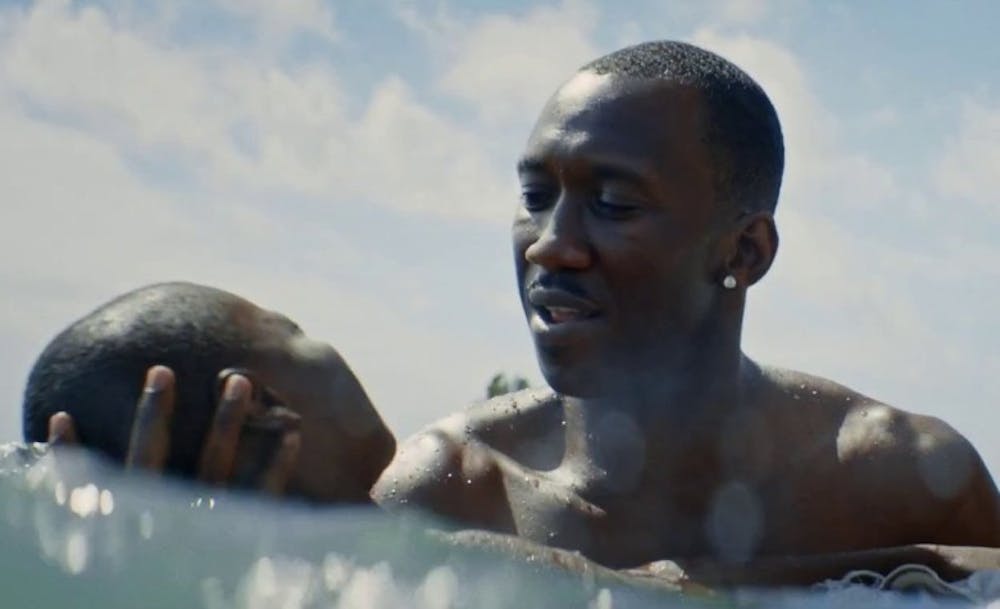Moonlight, much like its misunderstood central character Chiron, is incredibly easy to label. It is, at least according to the critics that seem to define the conversation surrounding it, a film about homosexuality and the pressures of masculinity; it's a portrait of black identity in a country whose mainstream culture is entirely whitewashed; it's a universal tragedy, a life-changing motion picture of tremendous emotional depth; it's a bold and fierce rejection of the rigid standards of an industry that has helped create harmful cultural stereotypes as much as it has benefitted financially off of them.
Barry Jenkins’ second feature film (after 2009’s Medicine for Melancholy), as previously mentioned, follows in glimpses the life of a young black boy named Chiron as he grows up in a rundown area of Miami. Based on the Tarell Alvin McCraney play In Moonlight Black Boys Look Blue, the story is broken into three distinct chapters in Chiron’s life — childhood, late adolescence and adulthood — all of which play a significant role in answering the question that constantly plagues him: “who am I?”
The first act, entitled “Little” after his not particularly endearing nickname as a boy, follows Chiron’s nine-year-old self, as he meets Juan, a non-stereotypical drug dealer who acts as his surrogate father while his single mother’s drug addiction becomes increasingly disruptive to her abilities as a parent. Picking up at age 16 at a time when his struggle with his masculinity and sexuality is more prevalent than ever and the source of severe bullying by his peers, the film’s second chapter — “Chiron” — acts as the pinnacle of Chiron’s emotional pain. The third act, “Black”, takes place several years into Chiron’s adulthood as he has made a living as a drug dealer much in the image of Juan and hardened himself to the trauma and emotional pain of his earlier years.
In Moonlight, Barry Jenkins has crafted an understated and intensely personal character study that is less a Shakespearean tragedy and more a portrait of unforgiving realism. The film intentionally avoids the visually overwhelming and emotionally conspicuous approach of a movie like Precious, as Chiron’s internal struggles are rarely articulated through words and actions, but instead, through gazes of longing and sadness that suggest his utterly disheartening lack of happiness from a young age. When Chiron does experience joy and love, it only exists in ephemeral spurts as a temporary relief from the inevitable pain, and when Jenkins does eventually seek out closure for his troubled characters, it is earned and then some as the product of finally coming to terms with life and its great hardships.
Cinematographer James Laxton cannot be overlooked for the role he played in Moonlight’s undeniable success, as his work doubled as both visually beautiful and meaningful. In Chiron’s childhood and adolescence (especially in the first act) the film’s color scheme was oversaturated and incredibly vibrant, with a propensity for extreme close-ups and a hyper focus on the most telling, yet seemingly insignificant details. It is presented in a manner that is sort of dreamlike, perhaps the slightly fading memories of an adult Chiron looking back on the most pivotal moments of his life. As the film moves chronologically forward, though, the hues become more monotonous and move toward a darker end of the color spectrum, perhaps suggesting the setting-in of life’s difficult and unhappy realities.
As touched upon earlier, Moonlight is an incredibly easy film to label. Any professional critic can slap social justice and industry-defying labels on the film and review it as if its just a more adult version of a Pixar film — existing mostly to champion a "moral of the story" type of plot, with some good filmmaking in between. But Barry Jenkins’ brilliant work of art is much more than that — it’s a tale of cause and effect, of how the events and people in our life come to define who we are, from the smallest aspects of our daily routine to the way we handle social situations or confront our inner demons. It’s the story of a lifetime.
Four and one half stars (out of five).






